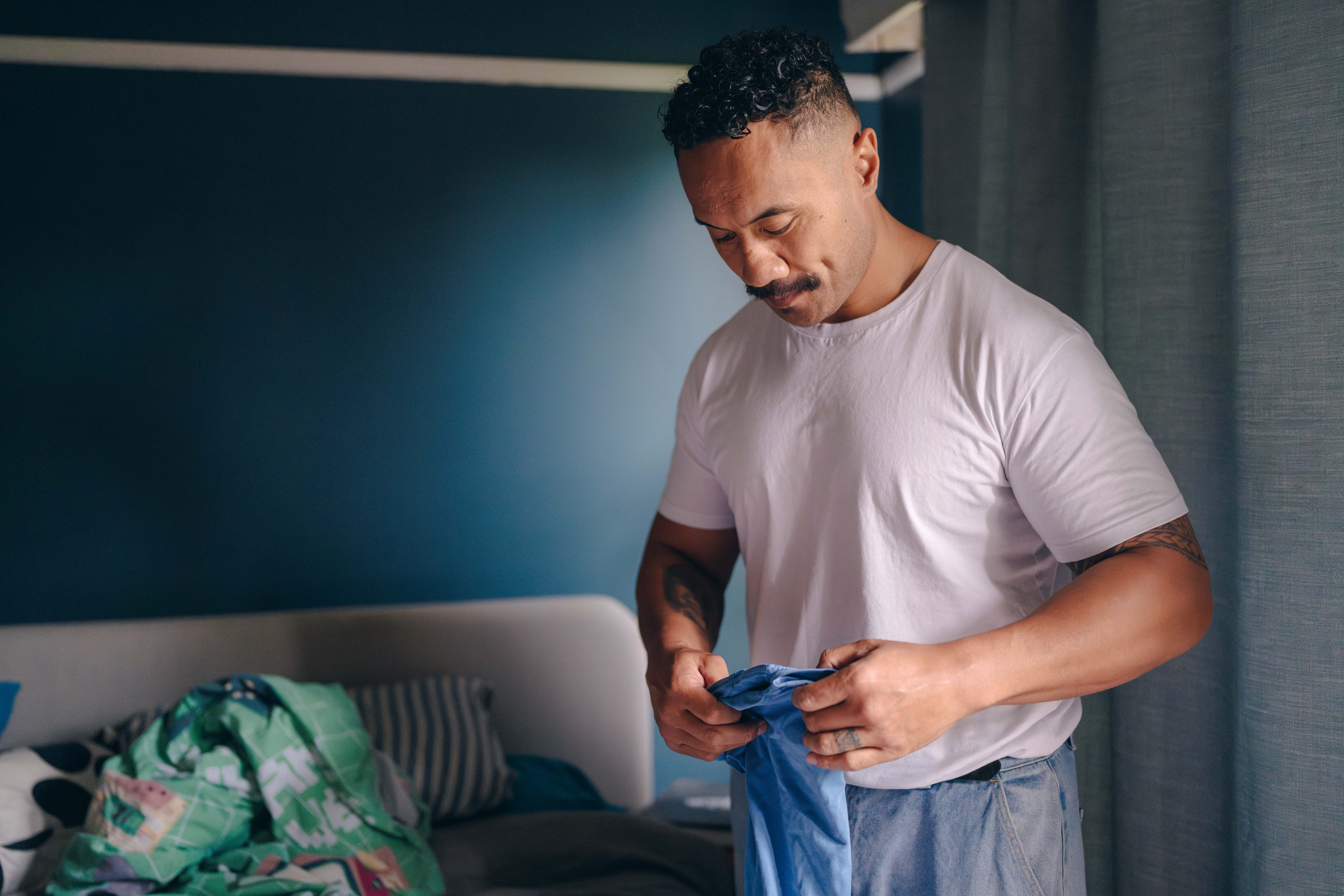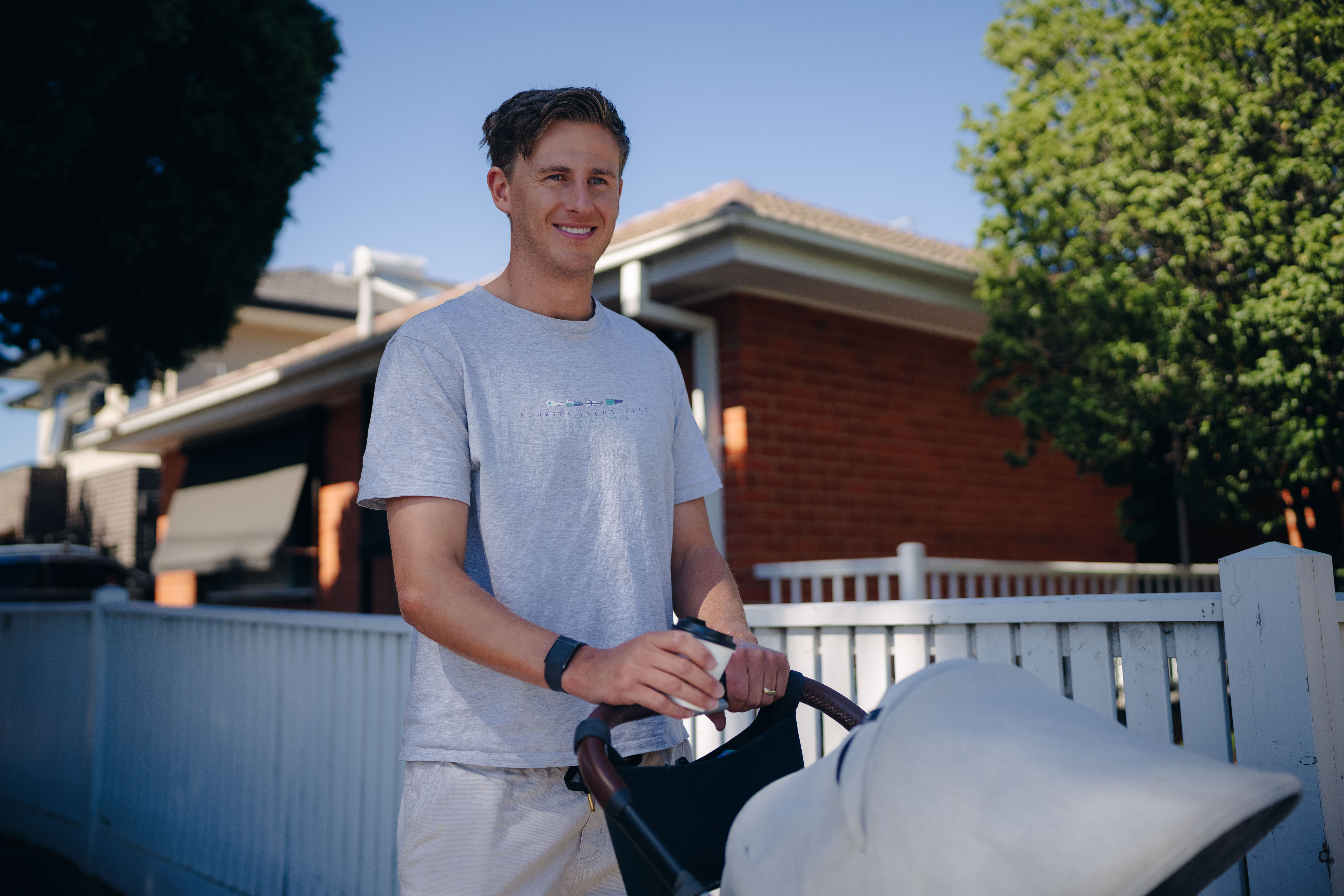In short:
There's no rule book on being a dad, so many of us follow the patterns and roles we grew up with. But these patterns often don't suit modern families, resulting in imbalances in both the joys and the work of parenting. Dads today can choose what fatherhood will look like for them, including:
- preparing for parenthood
- challenging stereotypes
- valuing equality in a relationship.
Becoming a parent is a life altering event. It's often assumed that mum will take on the primary caregiving role after birth, relying on a ‘maternal instinct’ to care for baby, manage the household, and juggle daily tasks. Dads? Our role is to provide for the family, take a backseat for the 'baby years', be the disciplinarians.
But where did these ideas come from, and is that how we really want to be dads today?
Redefining Dad
For Fui, becoming a dad meant breaking that mould.
I stay home and I work part time, and my wife is the breadwinner. I still see myself as a masculine man, but I sort of, you know, alter it here and there
Fui's dad was strict and had come from an even stricter family. Growing up he often felt like he was walking on eggshells around his father. Not wanting his children to have the same experience, Fui changed the formula. His choice has helped him form close, affectionate relationships with his children.
Introducing a newborn baby to the family home shifts the division of household labour in ways few people are prepared for. The volume of physical labour explodes: think laundry, nappy changing, meal preparation. Administrative tasks snowball: vaccinations, doctor appointments, childcare enrolments ... the list goes on.

First time dad Adam says while there's no rulebook on being a parent he understands it's a team effort. Adam works on construction sites and knows some guys have fixed views about what's a man's role and what's a woman's role, but he's not letting those interpretations restrict his parenting style.
Whether it's I do the dishes one day, whether it's she goes to work it's about just trying to be a really good example for my son. You don’t always have to fit in with others’ idea of masculinity. You can speak up and be your own man.

Research shows the household habits new parents form in the first year of having a child can last up to 10 years. Mums are taking on the lion's share of domestic labour, a divide that persists even if they return to work. And dads? We feel the pressure to work, to earn, to be the breadwinner, missing out on valuable time with our kids.
The impact this has on family life is profound. It undervalues household labor, splits parenting tasks by gender, and makes it harder for us to be an active parent in caring for our kids.
Add sleep deprivation, financial changes and a lack of clarity around how to parent as a team, this unequal division of labour can fuel resentment, isolation and relationship conflict.
What work do we value?
So what can we do to challenge outdated gendered expectations of parenting and promote equal and respectful relationships?
Programs like Baby Makes 3 run by healthAbility help new parents understand how relationships can change after having a baby, giving them tools to stay connected and confident as they adjust to life with a newborn baby.
healthAbility facilitator Sulochana Colombage says the program educates new parents on how their relationships will change after having a baby. Specifically, they ask expecting parents to consider how different roles are valued. Who’s sterilizing bottles, who’s running out to get wet wipes, who’s booking in with the maternal child health nurse? These aren’t paid jobs, but they’re critical. Where do you place the value in your relationship?
We often say the best conversations the [Baby Makes 3] program sparks happen on the car ride home. Because even people who are in healthy relationships might not have considered the unspoken assumptions they're carrying about caregiving.
A key component of the Baby Makes 3 program is bringing dads in. Highlighting the benefits of empowering families to plan and live the life they want to. Helping dads build and maintain respectful relationships, to engage and bond with their children early and often, to connect with other dads.
healthAbility facilitator Alex Mills says the program has busted the myth that men don't want to have these conversations. New dads want to connect, creating space for dads to learn from each other and build up their support network makes the transition easier.
The research backs it up. Dads and father figures are typically the first male role models for children, shaping how boys learn to express affection, establishing the blueprint for how young people show up in their relationships later in life.
Our [Baby Makes 3] program presents parents with a pretty undeniable proposition. The sooner you can start to have conversations about what equality and love and care looks like in a relationship, before you're sleep deprived and there's all this change happening, parents thrive, kids thrive, dads thrive.
Dads can do it too
When we’re supported to be hands-on parents, share responsibilities with our partner, and build strong bonds with our kids, our families flourish. So whether you’re about to be a first-time dad, you’ve been at it for years, or you’re just thinking about it for one day in the future, here are some tips for being the parent you want to be.
Normalise preparing for parenthood
Be a part of family planning conversations. Tell your GP you’re an expectant dad, join your partner at prenatal appointments, be proactive about opting in to support services.
Practice being a caregiver. Holding babies, settling and soothing isn’t about instinct, it’s about practice. Dads can do it too.
Activate your support networks before the baby arrives. Work out who you can lean on, it’s important for both parents to feel comfortable asking for help.
Challenge gender stereotypes early
If you’re with the baby, you’re parenting, not babysitting. And that counts. Arranging a playdate? Don't assume you need to contact mum to organise - get dads number too.
Value each other’s work. Switch it up. Alternate tasks with your partner like packing the nappy bag, bath-time, tummy time.
Don’t get sucked in to ‘boy stuff’ and ‘girl stuff.’ Having a new baby can be a minefield of pink bows and blue teddies. Tune out all the gendered messages about the clothes your child ‘should’ be wearing, the toys they ‘should’ be playing with, or the activities they ‘should’ be doing, and lean into whatever makes your little one happy.
Set equal expectations and play to each other’s strengths
Forget the 'default parent.' Either parent can register a child's birth, enrol them in childcare, or book and attend maternal child health appointments (many local councils offer after-hours appointments and new parents' groups, supporting this flexibility).
Divide the night shift. Taking turns settling the baby so both parents have an opportunity to rest is an important way to recognise that you value your partner's health and wellbeing. Keep checking in to find a balance that works.
Access shared leave policies and flexible work arrangements. Explore the options available at your workplace. Modern families divide care in different ways, talk to your partner about options to combine leave.
Stronger connections, better relationships
Modern dads want to be more involved in parenting, but we haven’t necessarily been shown the blueprint. We may have grown up with fathers who weren’t ‘hands-on.’ Seeing women carry most of the parenting load may have been normal for us, especially in the early years.
Changing this old story goes beyond individual families. Across our society we need parenting groups for new and expecting fathers, workplaces that embrace shared parental leave, inclusive antenatal care and visible changes like baby changes tables in all bathrooms.
But at the same time, there are steps we can take as individual men to redesign the parenting landscape to make fatherhood an equitable, joyous experience.
Learn more
- Alongside Baby Makes 3, healthAbility offers a carer support group for men, parenting support services, and a range of helpful programs for families.
- Balit Booboop Narrkwarren is a culturally adapted model of the Baby Makes 3 program for Aboriginal and Torres Strait Islander families.
- Family Man is a research-backed hub of parenting strategies from Movember, designed with dads in mind.
- Support for Fathers - 7 types of Dad
- Raising sons to embrace healthy, positive masculinity: 9 tips from Plan International, The Men’s Project and Equimondo.
- Talking to children about consent: Knowing about boundaries and body autonomy helps adults protect children against abuse and prepares them for a lifetime of respectful relationships.
- Why we keep talking about housework: Modelling respectful relationships at home.
- If you need support or advice, please reach out to the appropriate crisis and support organisation.
What Kind of Man Do You Want to Be?
We asked Victorian men about everything from fatherhood and relationships to online gaming and social media. Hear their stories.

